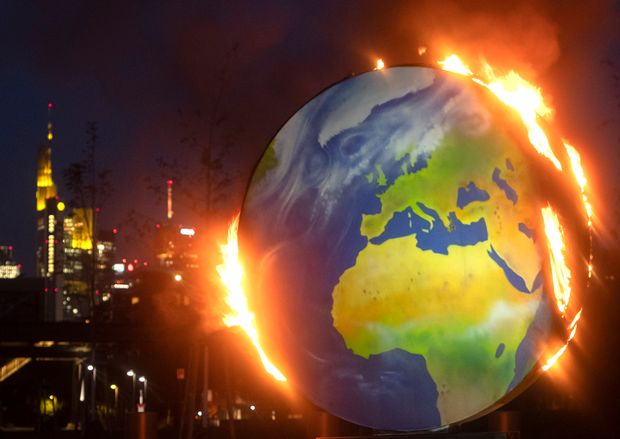
A demonstration with a burning globe takes place in front of the European Central Bank in Frankfurt this year. European leaders are frustrated with the Trump-led U.S. withdrawal from the Paris Climate Accord.
AP
The Trump-led U.S. formally left the Paris Climate Agreement on Wednesday, a voluntary global pact created five years earlier with the message that major economic powers must cooperate and lead against the threat of man-made climate change.
Challenger Joe Biden tweeted his commitment to return the U.S. to the global effort on “day one” if he prevails in the tight contest between the two.
The administration’s withdrawal was expected after Trump started the process a year earlier in accordance with the rules of the agreement. But the move still raises questions from lawmakers and environmental, security and trade groups, who see climate change as a key factor in U.S. foreign relations. That’s in addition to the major role the U.S. plays as the globe’s second-largest emitter of heat-trapping gases such as carbon dioxide behind China.
Even without the U.S., 189 countries, which are responsible for a combined 87% of global emissions, remain committed to the accord.
The pact aims to hold the increase in average global temperatures “well below” 2 degrees Celsius (3.6 degrees Fahrenheit), and ideally no more than 1.5C (2.7 F), compared to pre-industrial levels. Scientists argue that unchecked warming will be responsible for raising sea levels, stoking tropical storms and worsening droughts and floods.
The only binding requirement of the voluntary pact is that nations have to accurately report on their efforts.
President Trump in triggering the withdrawal has argued that the U.S. shoulders an unfair burden relative to polluters China, India, Brazil and other mostly developing nations.
“The Paris Climate Accord is simply the latest example of Washington entering into an agreement that disadvantages the United States to the exclusive benefit of other countries, leaving American workers — who I love — and taxpayers to absorb the cost in terms of lost jobs, lower wages, shuttered factories and vastly diminished economic production,” Trump said early in his administration, a stance he has stuck with.
In recent weeks, China, Japan and South Korea have joined the European Union and others in setting national deadlines to stop pumping more greenhouse gases into the atmosphere. The German government for one has said it was “highly regrettable” that the U.S. had left the pact.
Related: Mega-polluter China sets date for curbing emissions, dialing up the pressure on the U.S.
Biden’s proposed $2 trillion climate initiative seeks to decarbonize the power sector by 2035 and reach net-zero emissions across the entire economy by 2050. If Biden secures the White House, he could return the U.S. to the Paris pact in 30 days.
Some polls show that many Americans liked what the Paris effort called for. A set of surveys conducted by the group Resources for the Future, in conjunction with Stanford University, found 81% of those polled favor a national effort to lower U.S. greenhouse gas emissions by 25% from 2005 levels by 2025, although with no penalty for failing to achieve this goal. This goal was a major part of the U.S. commitment to the Paris Agreement, although the survey did not mention the Paris pact explicitly. Of that 81%, 53% of Republicans, 71% of Independents and 96% of participating Democrats indicated they support the underlying principles of the global agreement.
With a federal effort in flux, the private sector is taking on some of the emission-reduction burden, including tech giants Microsoft MSFT, +4.82% and Apple AAPL, +4.08%.
Lower levels of government also believe they cannot wait for a national plan.
“Eleven states and counting have committed to transition to 100% clean energy, while other states have passed laws implementing carbon emission reduction targets,” said Beth Kerttula, president of the National Caucus of Environmental Legislators. “States also continue to innovate on advancing renewables, efficiency, storage, electrified transportation and a smart, resilient electrical grid.”
The Associated Press contributed to this report.





